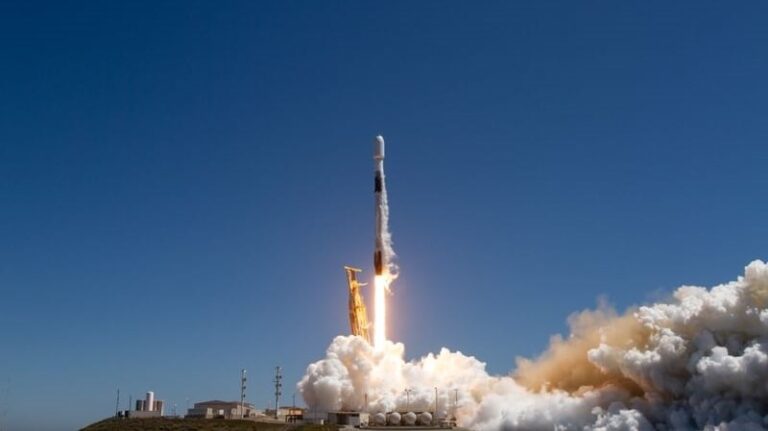Bayanat AI PLC (ADX: BAYANAT), a leading provider of AI-powered geospatial solutions, and Al Yah Satellite Communications Company PJSC (ADX: Yahsat), the UAE’s flagship satellite solutions provider, Saturday announced the successful launch of their first Low Earth Orbit (LEO) Synthetic Aperture Radar (SAR) satellite into orbit on August 16.
This was done in partnership with ICEYE, a pioneer in SAR satellite operations for earth observation, persistent monitoring, and natural catastrophe solutions.
In a landmark achievement, the Bayanat-owned SAR satellite, in collaboration with Yahsat, was launched via integrator Exolaunch and successfully lifted off aboard SpaceX’s Transporter 11 rideshare from Vandenberg Space Force Base in California, USA.
The satellite has established communication, and early routine operations are underway.
Launching the UAE’s first SAR satellite is a significant milestone for the companies and the region to bolster Earth Observation capabilities.
As part of the Earth Observation Space Program, this satellite debuts the comprehensive SAR constellation that will deliver high-resolution, persistent monitoring solutions.
The satellite will use SAR technology, an active sensing system that illuminates the Earth’s surface and measures the reflected signal to generate high-resolution images.
Unlike traditional optical imaging satellites, SAR can capture images day and night, regardless of weather conditions or solar illumination.
Compared to other new Space SAR satellite services, ICEYE’s radar antenna covers much larger geographical areas and provides higher-resolution images of smaller areas, providing more value to customers.
The Earth Observation Space Program is a testament to Bayanat and Yahsat’s unwavering commitment to advancing the UAE’s space sector, fostering local talent, and establishing sovereign satellite data acquisition and processing capabilities.
The satellite’s successful launch reaffirms the UAE leadership’s progressive vision to achieve its National Space Strategy 2030.
This collaborative effort positions Bayanat and Yahsat at the forefront of the region’s burgeoning space ecosystem, driving innovation and supporting national and commercial interests.
Managing Director of Bayanat, Hasan Al Hosani, said, “The launch of our first satellite marks a highly anticipated milestone for both our collaborative efforts and for the UAE. This is a triumphant moment for Bayanat and a defining step toward our future as Space42. Inaugurating, our Earth Observation capabilities, including the debut of our SAR satellite constellation, will further strengthen our position as a leader in AI-powered geospatial analytics. Our ongoing partnership with ICEYE, building on our shared ambition with Yahsat, continues to prove invaluable, enabling us to leverage space insights for informed decision-making on Earth.”
Group CEO of Yahsat, Ali Al Hashemi, said, “The successful launch of our SAR satellite is a testament to the synergies between Bayanat and Yahsat as we press ahead with the anticipated merger to form Space42. The SAR satellite constellation to be launched over the next 3 years will enable us to expand as a multi-orbit satellite operator, encompassing Geostationary Orbit and Low Earth Orbit satellites while also developing satellite manufacturing capabilities in the UAE. This significant step also solidifies our extensive experience and reaffirms our place as pioneers in the UAE’s space sector and a significant player in the global SpaceTech industry.”
The satellite launch is the latest achievement from the ongoing partnership between Bayanat, Yahsat, and ICEYE.
In 2023, the Earth Observation Space Programme was created to build national satellite remote sensing and Earth Observation capabilities within the UAE by building a SAR satellite constellation.
The constellation of LEO satellites will provide a consistent data stream for end-to-end solutions for SAR applications.
It will cover the entire value chain by leveraging the available synergies in Yahsat’s upstream and midstream capabilities and Bayanat’s downstream capabilities.
The orbiting satellites will revisit the Middle East more frequently, enabling Bayanat and Yahsat to deliver near real-time, high-definition images of on-the-ground conditions across the region and beyond.
This strategic initiative enhances the companies’ ability to provide timely and accurate geospatial insights, critical for applications in disaster management, maritime surveillance, and smart mobility.
WAM



